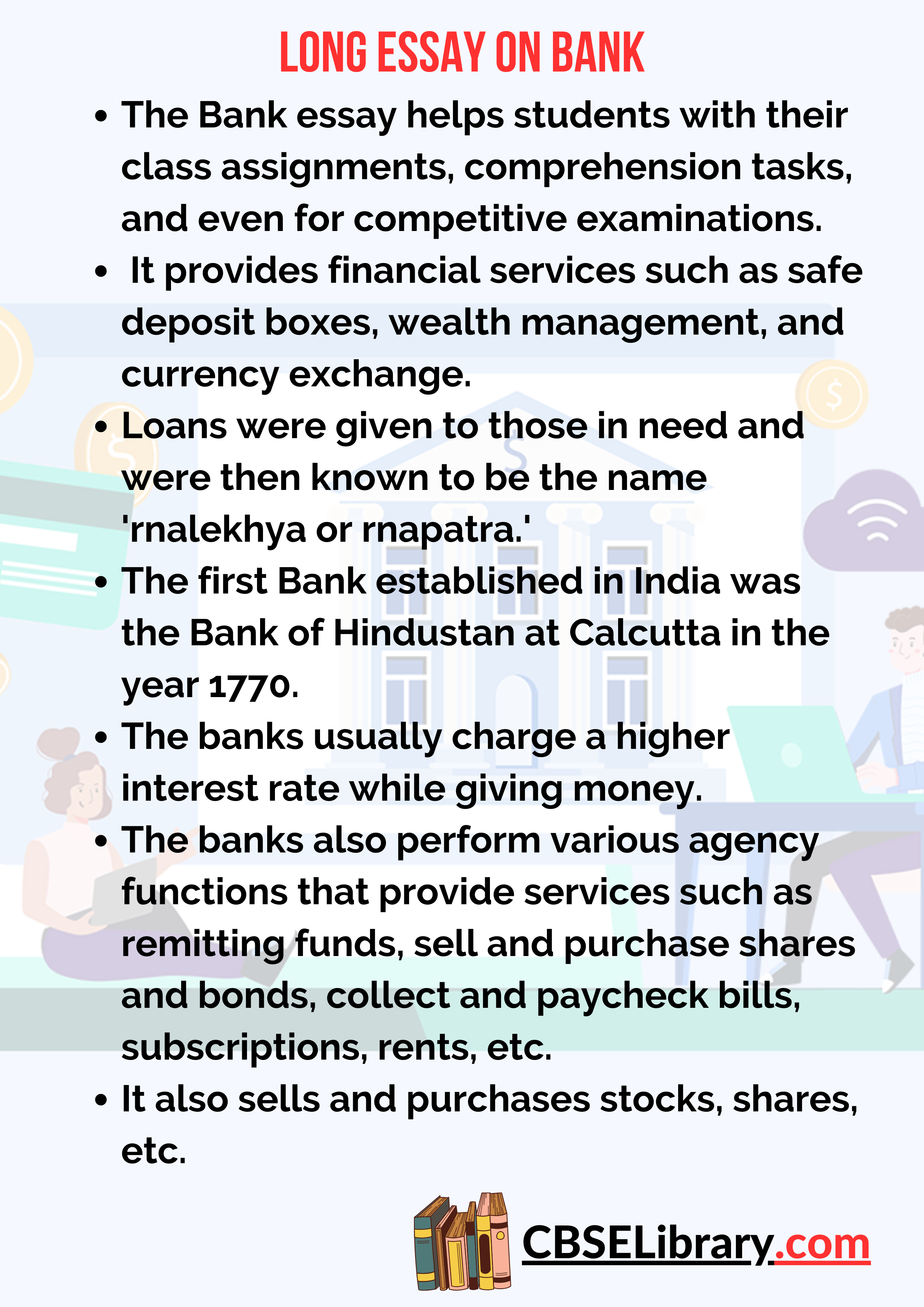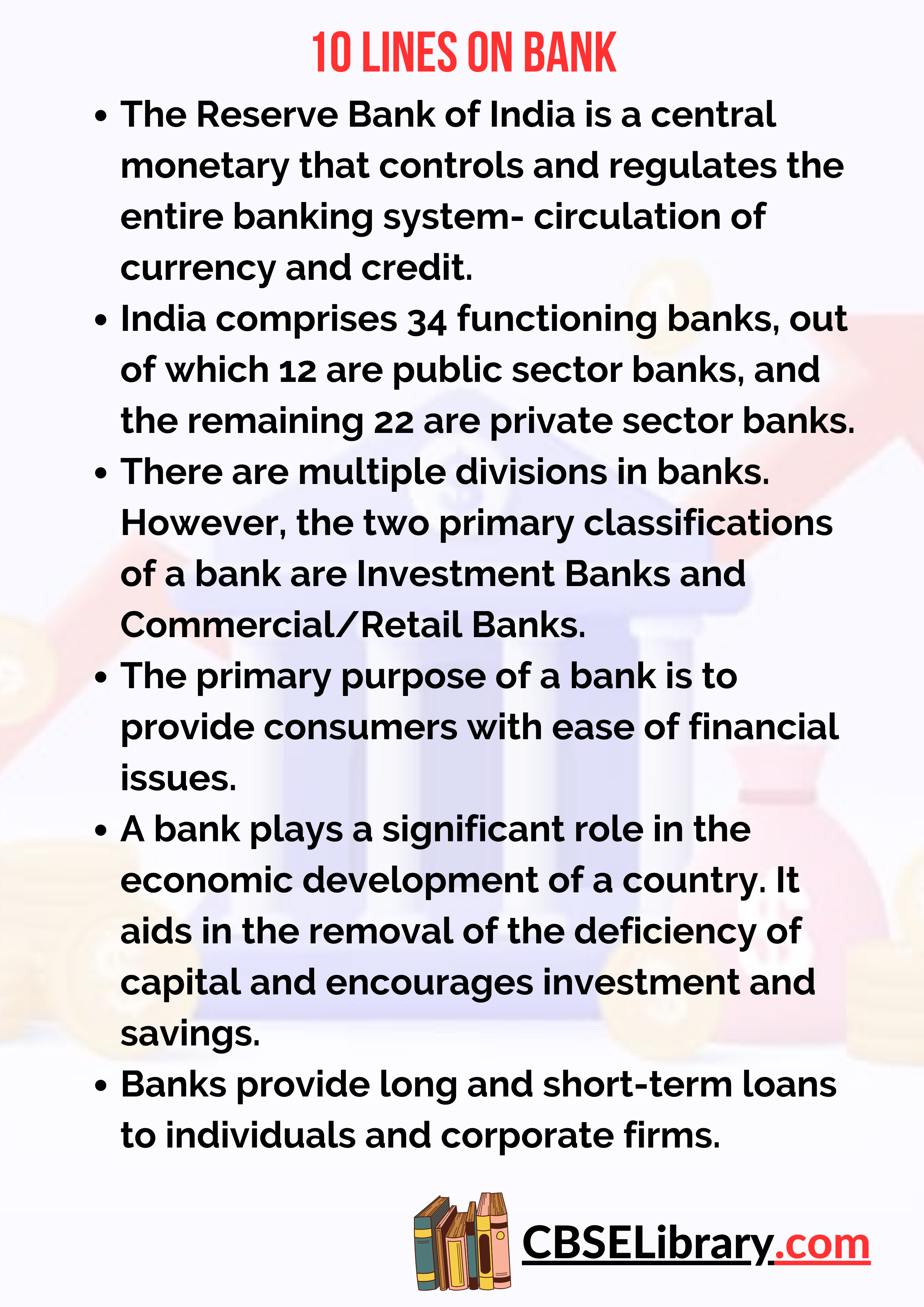Essay on Bank: Banks are financial institutions that provide a loan or save customer’s money. The term ‘Bank’ is derived from the word ‘Banc’ or ‘Banque,’ which means a bench upon which the ancient day financiers would display their coins or transact their business in the market space.
Banks are an elemental part of society. Banks are located in different parts of the country and deal directly with the general public. They provide multiple services on customer-based requirements and provide lockers, ATM Services, money transfer, loans for houses and businesses, and several other monetary services.
Thus, Bank (s)provides primary monetary services that boost the economic development of the country.
You can read more Essay Writing about articles, events, people, sports, technology many more.
Long and Short Essay on Bank for Students and Kids in English
We have mentioned two essays- a 500 words Long Essay and a 200 words Short Essay. The extended essay on Bank consists of 400-500 words. The Long essay provides a framework that helps students with their competitive exams and assignments. The short essay on Bank is written for 200 words and is suitable for children and kids with their classwork.
Long Essay On Bank 500 Words in English
Given below is an extended essay on Bank for aspirants of competitive exam and students belonging to classes 6,7,8,9, and 10. The Bank essay helps students with their class assignments, comprehension tasks, and even for competitive examinations.
A bank is a licensed monetary institution to make loans and receive or deposit money. It provides financial services such as safe deposit boxes, wealth management, and currency exchange.
The inception of a Bank/Banking system in India goes back to the Vedic civilization. Loans were given to those in need and were then known to be the name ‘rnalekhya or rnapatra.’ As time evolved, Big merchants and business people started bidding interests on loans to farmers and small traders and the unpayable assets were confiscated.
The first Bank established in India was the Bank of Hindustan at Calcutta in the year 1770. This was followed the start of other banks such as Bank of Calcutta, Bank of Madras, and Bank of Bombay in the early 19th century.
Classifications of a Bank
- Commercial Bank: Theses may be government-owned or a private bank. There are 20 major commercial banks
- Industrial or Investment Banks: These banks provide long-term loans or other features to any industrial concerns.
- Exchange Banks: These banks deal with the foreign exchange of currencies. A few Indian commercial banks also handle foreign currency exchange deals.
- Co-operative Banks: These are set-up regarding small-scale industries and farmer’s concern. Co-operative banks are subcategorized as Central Co-operative Banks and State Co-operative Banks.
- Land Mortage Banks: These banks provide loan-term debentures to agriculturalists and farmers.
- Central banks: This Bank occupies the central position in the country and is the financial market’s statutory body.
- Saving Banks: these banks promote savings scheme among the middle-class families. However, the savings accounts are monitored by the commercial banks in India.
- Indigenous banks: These lend money and finance the country’s internal trade.
- Regional Rural Banks: Theses banks are set-up by the central government for the economic development of rural regions. The commercial banks sponsor these banks.
Functions of a Bank
The essential function of a bank is to receive deposits. Theses deposits are received as fixed deposits- which have a limited time frame, current deposits- require no interests and are framed mainly for business people and savings bank deposits to encourage savings with a 5 percent interest rate.
Another primary function of a bank is to lend money through cash credits or loans, overdrafts, or discounting bills. The banks usually charge a higher interest rate while giving money.
The banks also perform various agency functions that provide services such as remitting funds, sell and purchase shares and bonds, collect and paycheck bills, subscriptions, rents, etc.
Importance of a Bank
A bank helps people cultivate the habit of saving and provides safe custody. It collects bills, drafts, cheques, and grants credit facilities and loans to people. It facilitates making payments and secures the overdrafts and loans.
A bank also provides safe custody of valuables such as deeds, ornaments, documents, jewels, etc. It also sells and purchases stocks, shares, etc. A bank is essential as it provides Credit information and a Letter of Credit and acts as representatives and makes correspondence.
Top 10 Indian Banks
- HDFC Bank
- Axis Bank
- IDFC Bank
- SBI
- Bank of Baroda
- Punjab National Bank
- ICICI Bank
- Canara Bank
- IDBI Bank
- Bank of India
Thus, a bank forms an integral part of society and is a critical factor that boosts economic development in the country.

Short Essay on Bank 200 Words in English
The 200 words short essay mentioned below is suitable for kids and children up to 6th standard. The essay is written to guide the children with their school works-assignments and comprehension exercises.
A bank is a financial institution that provides funds based on credits to firms or individuals and accepts money deposits from the general public. A bank offers various functions such as transfer of funds, issuance of drafts, locker facility, portfolio management, etc. The first established Indian Bank is the Bank of Hindustan, located at Calcutta in 1770.
There are different types of functioning banks, such as Retail banks, national banks, investment banks, savings banks, co-operative banks, commercial banks, land mortgage banks, exchange banks, industrial banks, and consumer banks.
A bank provides multiple functions such as eases trade and commerce, promote agricultural sectors, ensure safe deposits, aids industrial developments, provides employment, and encourages saving habits.
A bank plays a vital role in the economic development of a country as it removes the deficiency of capital and encourages investment and savings. It resembles all the savings of society and makes it available for investment.
There are a total of 34 functioning banks in India; out of 12 banks are public sector banks, and the remaining 22 banks are private sector banks. The Top ten banks include
- HDFC Bank
- Axis Bank
- IDFC Bank
- SBI
- Bank of Baroda
- Punjab National Bank
- ICICI Bank
- Canara Bank
- IDBI Bank
- Bank of India
In short, Indian banks play an essential role in boosting the economic development of a country. It mobilizes the financial resources and flow of money in a society.
10 Lines on Bank Essay
- Banks are government-certified financial institutions that lend or receive money deposits.
- The Bank of Hindustan was the first Bank to be established in 1770 at Calcutta, while the State Bank of India, established in 1906, is the oldest functioning Bank.
- Banks provide long and short-term loans to individuals and corporate firms.
- The Reserve Bank of India is a central monetary that controls and regulates the entire banking system- circulation of currency and credit.
- India comprises 34 functioning banks, out of which 12 are public sector banks, and the remaining 22 are private sector banks.
- There are multiple divisions in banks. However, the two primary classifications of a bank are Investment Banks and Commercial/Retail Banks.
- The primary purpose of a bank is to provide consumers with ease of financial issues.
- A bank plays a significant role in the economic development of a country. It aids in the removal of the deficiency of capital and encourages investment and savings.
- A bank also performs other services such as remitting funds, sell and purchase shares and bonds, collect and paycheck bills, subscriptions, rents, etc.
- The Bank acts as the lifeline of any economy and is significant for the development of a country.

FAQ’ On Bank Essay
Question 1.
State the significant functions of a bank?
Answer:
A bank’s primary function includes cash credits, overdrafts, discounting bills, granting loans, and accepting deposits. While their secondary duties include providing consumer finance, safe deposit for valuables, issues letter of credit, educational loans, etc.
Question 2.
Which is the first Indian Bank?
Answer:
The first Bank to be established in India was the Bank of Hindustan in 1770 at Calcutta.
Question 3.
State the various types of banks?
Answer:
A bank is classified as national banks, investment banks, retail banks, savings banks, industrial banks, co-operative banks, commercial banks, exchange banks, consumer banks, and land mortgage banks.
Question 4.
Name the top ten Indian banks?
Answer:
HDFC Bank, Axis Bank, IDFC Bank, SBI, Bank of Baroda, Punjab National Bank, ICICI Bank, Canara Bank, IDBI Bank, and Bank of India.
